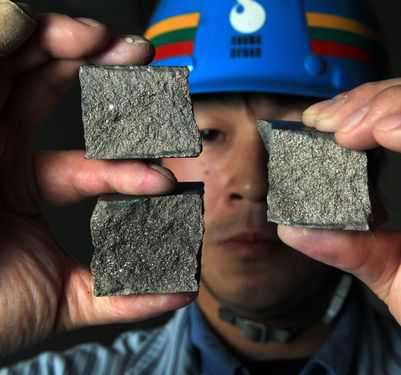
Kazakhstani-Japan Economic Partnership Drives Forward
Publication: Eurasia Daily Monitor Volume: 10 Issue: 34
By:

On February 18–19, Deputy Prime Minister and Minister of Industry and New Technologies Asset Issekeshev led a delegation of Kazakhstani government and business leaders to Japan. They signed a number of agreements with major Japanese companies, especially in the nuclear energy sector. These deals should see the two countries further develop their mutually beneficial economic partnership in coming years.
Since establishing formal diplomatic relations with Kazakhstan in 1991, Japan has provided around one billion dollars in Official Development Assistance, making it one of the largest foreign aid donors (Embassy of the Republic of Kazakhstan in Japan). These funds have helped Kazakhstan close its Semipalatinsk nuclear test site, manage its water resources, and develop its transportation and other infrastructure, including rehabilitating Astana International Airport. In the last few years, the relationship has become more balanced, with Kazakhstan offering Japan important natural resources and investment opportunities. Private Japanese companies now invest more in Kazakhstan than Japan’s government. The Japanese ambassador to Astana, Yuzo Harada, has said that his country’s firms have found Kazakhstan’s business environment increasingly attractive in recent years (Kazinform, March 14, 2012).
According to Kaznex Invest, the government agency responsible for promoting non-resource exports and attracting more foreign investment to the Central Asian republic, trade turnover between Kazakhstan and Japan during the past five years amounted to $7 billion, closely balanced with Kazakhstan importing $3.4 billion in Japanese goods and exporting $3.5 billion in goods to the East Asian nation (ITAR-TASS, February 18). Bilateral trade grew by 50 percent between 2010 and 2011, to $1.6 billion (Kazinform, March 14, 2012). Japanese direct investment in Kazakhstan now exceeds $4 billion, with some 45 active Japanese projects worth about $26 billion and more than 70 Kazakhstani-Japanese joint ventures, many involved in the mining of uranium and rare earth metals (ITAR-TASS, February 18). Japan’s Inpex Corporation is one of the seven largest international oil and gas companies that are developing Kazakhstan’s enormous Kashagan field in the Caspian, and owns 7.6 percent of the shares in the consortium.
These bilateral trade and investment figures should increase in coming years since several new deals were reached during Issekeshev’s visit. For example, Kaznex signed a memorandum with Chiyoda Consulting to support the manufacture of molybdenum powders and plates, as well as with Sumitomo Corporation on cooperation in various energy projects. Kazakhstan’s Dala Mining and Japan’s Itochu Corporation signed an agreement on the joint mining and processing of tungsten-molybdenum ore deposits at Koktenkol in the Karaganda region. KSP Steel, on the other hand, secured the support of several Japanese partners to collaborate on expanding steel exports (Kazakhstan General Newswire February 19).
During the last few years, Kazakhstan and Japan have also developed an extensive nuclear energy partnership to supplement their longstanding cooperation in support of nuclear disarmament and nonproliferation. Kazakhstan supplies Japan with large quantities of natural uranium in return for substantial Japanese technical assistance to Kazakhstan in developing and constructing nuclear reactors as well as providing other nuclear services.
In the course of Issekeshev’s visit, Kazkahstan’s National Nuclear Center signed memoranda of understanding with the Japanese Atomic Energy Agency and the Japan Atomic Power Company designed to prepare Kazakhstan to operate domestic nuclear power plants in the next few years. The parties will cooperate on joint feasibility studies of possible projects, the education and training of Kazakhstan’s nuclear workers, as well as other areas (Tengrinews, February 20). Although Kazakhstan closed its Russian-supplied BN-350 fast reactor at Aktau in 1999, the government wants to develop a domestic nuclear power industry so that it can export more of its oil and natural gas to foreign markets rather than consume these resources at home. With Japan’s nuclear reactors closed since the 2011 Fukushima Daiichi nuclear disaster, Japanese nuclear firms are eager to develop foreign markets as well as share the lessons they have learned from the disaster and other technological and operational insights.
The visit also secured Japanese cooperation in developing Kazakhstan’s “green economy.” Building on earlier cooperation in renewable energy sources, Japan’s Industrial Technology Development Organization (NEDO) discussed expanding the country’s use of energy-saving technologies such as thermocouples, solar cells, next-generation batteries, and light-emitting diode (LED) light bulbs (Trend, February 18). Japan is eager to help Kazakhstan reduce its carbon emissions as part of Tokyo’s commitment to help manage regional and global climate change.
Deputy Prime Minister Issekeshev also presided over the signing of a memorandum between Toyota Motor Corporation and Kazakhstan’s Saryarka AvtoProm company in Kostanay to manufacture the Toyota Fortuner. Issekeshev told the media that production of these vehicles would begin in 2014, generating several hundred local jobs. He added that increasing automobile production in Kazakhstan was part of the government’s efforts to increase domestic industrial manufacturing and diversify the economy away from natural resource exports. Issekeshev estimated that of the 100,000 new cars sold in Kazakhstan last year, some 20 percent were manufactured in the country. The president and CEO of Toyota Motor Europe, Didier Leroy, noted that more than 20,000 Toyota and Lexus cars have been sold in Kazakhstan since 2009, with 10,000 in 2012. Toyota Motor Kazakhstan LLP, a sales unit established in May 2008, therefore, decided to establish a local manufacturing plant since it concluded that this high level of sales would continue (Tengrinews, February 18).
The Kazakhstani-Japanese partnership appears to be a natural fit. Japan is eager to access Kazakhstan’s rich mineral and energy resources, which include oil, gas, uranium and various rare earth minerals, while Kazakhstan wants to diversify its economic ties, obtain advanced Japanese technology, and strengthen its own Asian “pivot.”




